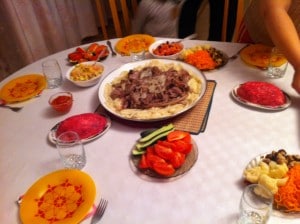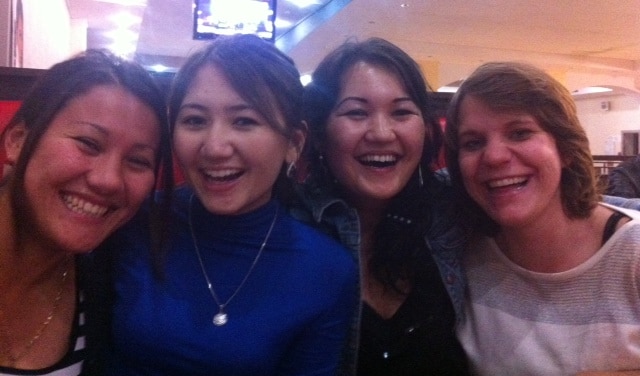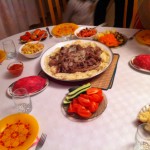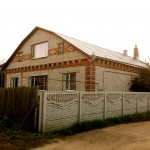From the moment I decided to come to Kazakhstan to teach English, I knew I wanted to stay in a host family. Multiple times family and friends tried to talk me out of this. After all, why on earth would a young 22-year-old, independent young woman want to move in with another family, taking on all the duties and responsibilities that assumes?
For me, there were two large and very practical reasons. Firstly, since I knew I would be teaching English, I wanted to live in a place where I would be forced to use my Russian! Secondly, coming from Texas, I have never experienced a real winter. So, I wanted to find someone who could help me learn how to dress in the cold months I have ahead.

My host family has provided this and so much more! In the mere five weeks I have lived with this family, I have learned so much more about Kazakh culture than I could from living alone in an apartment. The place in the house where we have spent the most time together is in the kitchen. In the kitchen, I learned about Kazakh teatime. When I’m invited down for tea, I’ve learned to be ready to indulge in a small feast. Our typical teatime includes bread, sausage, cheese—together known as “buterbrod” (бутерброд), and a large array of sweets. When I eat less than three sweets, my host family asks me, “What’s wrong? Are you not hungry?”
In addition, eating dinner with my host family is a part of my daily routine. Our meals typically include soup, meat, and more бутерброд, while fruits and salads are reserved for special occasions or the weekend. Interestingly, the meat is placed in the middle of the table on a plate, and we all reach and grab it with our hands, and in the place of napkins, all the family members wipe their hands on one towel. For me, this is starkly different from my family, as we have always been expected to eat with a knife, fork, and napkin in our lap.
More than the food we share together, I greatly enjoy the conversation we have over dinner. Getting to know people of various cultures is undoubtedly the best part of traveling to a new place. Through this daily coming together, I have already created relationships with each member of my host family that will, I’m sure, continue past my year here.
Another great lesson I’ve learned from my host family is how to give a proper birthday toast. While in America, a simple “happy birthday” is sufficient, in Kazakhstan, much more is expected. The Kazakhs, similar to the Russians, give original, eloquent, and heart-felt toasts in order to express “happy birthday.” In these small speeches, on is expected to say all he/she wishes and hopes for the birthday boy/girl in the next year.

I experienced this first hand in my third week here when my “host brother” had his 17th birthday. To celebrate, his mother prepared the national dish, beshbarmak (бешбармак), a hearty meat and noodle dish, and invited relatives over for dinner. In total, 13 guests came, and every single one of us toasted the birthday boy. The father played the role of tаmada (тaмада), which means “toast master.” Throughout the meal, the тамада calls on various people to say a toast (сказать тост). Everyone, including the youngest cousins, gave some sort of toast. As each person spoke, I listened carefully so that I would know what to say.
Once it was my turn, I was ready! To begin, I said that I was glad to have met my host brother and very grateful to his family for hosting me. Following that, I wished him a happy birthday, health, and success in his school exams. Lastly, I told him to be grateful for his loving, wonderful parents and to always listen to his older sister. While I am sure many I made many grammatical errors with the Russian I used, I believe I adequately got my point across, because my host family responded positively! On this evening, my connection to the culture here grew deeper than just speaking the same language.
Thus far, my favorite aspect of Kazakh culture that I have discovered is the strong family connections here. Kazakh families are typically large—the mother and father in my host family each have seven siblings, and Kazakhs work to keep up strong relationships among extended family members. Nearly every night of the week, my host parents are hosting relatives or going to a relative’s house for dinner. Additionally, when I speak with Kazakh friends, they frequently refer to their cousins simply as “brother” and “sister.” The full words for cousin in Russian are “двоюродный брат” and “двоюродная сестра” (which contain the words for brother and sister but prefixed by the adjective двоюродный – derived from the words “два,” or “two” and “род,” which means “relation” or ” birth.”) However, in Russian-speaking cultures cousins often spend considerable time together while growing up and it is very common to drop the adjective and simply refer to your cousin as “brother” or “sister.” Coming from a culture that values independence, it has been neat to experience a more communal culture, one that emphasizes family connections.
Deciding to live with a host family has been one of the best decisions I have made in Kazakhstan. Through them, I have learned so much about their beautiful culture and have truly found a place to call home for my time here in Kostanay, Kazakhstan.






